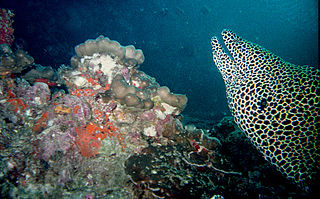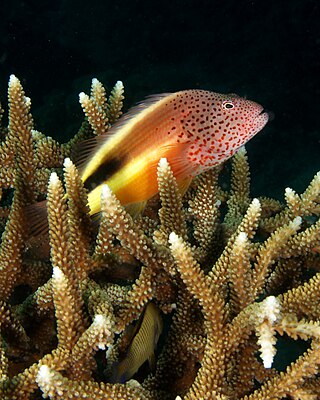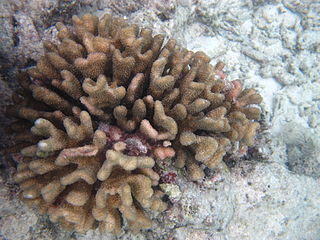
The Philippine Sea is a marginal sea of the Western Pacific Ocean east of the Philippine Archipelago and the largest sea in the world, occupying an estimated surface area of 5 million square kilometers. The Philippine Sea Plate forms the floor of the sea. Its western border is the first island chain to the west, comprising the Ryukyu Islands in the northwest and Taiwan in the west. Its southwestern border comprises the Philippine islands of Luzon, Catanduanes, Samar, Leyte, and Mindanao. Its northern border comprises the Japanese islands of Honshu, Shikoku and Kyūshū. Its eastern border is the second island chain to the east, comprising the Bonin Islands and Iwo Jima in the northeast, the Mariana Islands in the due east, and Halmahera, Palau, Yap and Ulithi in the southeast. Its southern border is Indonesia's Morotai Island.

The Indo-Pacific is a vast biogeographic region of Earth. In a narrow sense, sometimes known as the Indo-West Pacific or Indo-Pacific Asia, it comprises the tropical waters of the Indian Ocean, the western and central Pacific Ocean, and the seas connecting the two. It does not include the temperate and polar regions of the Indian and Pacific oceans, nor the Tropical Eastern Pacific, along the Pacific coast of the Americas, which is also a distinct marine realm. The term is especially useful in marine biology, ichthyology, and similar fields, since many marine habitats are continuously connected from Madagascar to Japan and Oceania, and a number of species occur over that range, but are not found in the Atlantic Ocean.

The melon butterflyfish or the Indian redfin butterflyfish, is a species of marine ray-finned fish, a butterflyfish belonging to the family Chaetodontidae. It is found in the Indian Ocean from East Africa to Western Java. This is one species of a closely related group which includes the blacktail butterflyfish of the Red Sea and Gulf of Aden and the oval butterflyfish which is found in the western Pacific, from eastern coasts of the Indonesian islands to Australia.

Pocillopora meandrina, commonly known as Cauliflower coral, is a species of coral occurring in the Indo-Pacific and Pacific oceans. This coral lives in shallow reef environments.

The Western Indo-Pacific is a biogeographic region of the Earth's seas, comprising the tropical waters of the eastern and central Indian Ocean. It is part of the larger Indo-Pacific, which includes the tropical Indian Ocean, the western and central Pacific Ocean, and the seas connecting the two in the general area of Indonesia. The Western Indo-Pacific may be classified as a marine realm, one of the great biogeographic divisions of the world's ocean basins, or as a subrealm of the Indo-Pacific.

The Central Indo-Pacific is a biogeographic region of Earth's seas, comprising the tropical waters of the western Pacific Ocean, the eastern Indian Ocean, and the connecting seas.

The arc-eye hawkfish, the ringeye hawkfish, horseshoe hawkfish or whiteline hawkfish, is a species of marine ray-finned fish, a hawkfish belonging to the family Cirrhitidae. It is found in shallow waters in the tropical Indo-Pacific on reefs, resting on coral heads much of the time.

Pocillopora is a genus of stony corals in the family Pocilloporidae occurring in the Pacific and Indian Oceans. They are commonly called cauliflower corals and brush corals.
Pocillopora inflata is a species of stony coral in the family Pocilloporidae. It was first described by Peter William Glynn in 1999. It is found growing on coral reefs in the tropical eastern Pacific Ocean but is nowhere abundant.

Acropora grandis is a species of colonial stony coral. It is a large species with multiple branches forming a bush-like structure and is found on reefs and in lagoons. It is native to the tropical western Indo-Pacific and has a range extending from East Africa to the east coast of Australia.

Pocillopora damicornis, commonly known as the cauliflower coral or lace coral, is a species of stony coral in the family Pocilloporidae. It is native to tropical and subtropical parts of the Indian and Pacific Oceans.

Pocillopora verrucosa, commonly known as cauliflower coral, rasp coral, or knob-horned coral, is a species of stony coral in the family Pocilloporidae. It is native to tropical and subtropical parts of the Indian and Pacific Oceans.

Acropora digitifera is a species of acroporid coral found in the Gulf of Aden, the Red Sea, the southwest and northern Indian Ocean, Australia, Southeast Asia, the central Indo-Pacific, Japan, the west Pacific Ocean and the East China Sea. It is found in shallow areas of tropical reefs in the back margins, from depths of 0 to 12 m. It was described by James Dwight Dana in 1846.

Acropora robusta is a species of acroporid coral found in the Red Sea, the Gulf of Aden, the southwest and northern Indian Ocean, the central Indo-Pacific, Australia, Southeast Asia, Japan, the East China Sea and the oceanic west and central Pacific Ocean. It occurs in tropical shallow reefs, mainly along margins that are exposed to the action of strong waves, and can be found at depths from 1 to 8 metres. It was described by Dana in 1846.

Acropora tenuis is a species of acroporid coral found in the Red Sea, the Gulf of Aden, the southwest, northwest and northern Indian Ocean, the Persian Gulf, the central Indo-Pacific, Australia, Southeast Asia, Japan, the East China Sea and the oceanic west and central Pacific Ocean. It occurs in tropical shallow reefs on upper slopes and in subtidal habitats, at depths of 8 to 20 metres.

Acropora valida is a species of acroporid coral found in the Red Sea, the Gulf of Aden, the southwestern, northwestern and northern Indian Ocean, the Persian Gulf, the central Indo-Pacific, Australia, southeast Asia, Japan, the East China Sea, the oceanic western, central and far eastern Pacific Ocean, the northwestern Hawaiian Islands and Johnston Atoll. It occurs in tropical shallow reefs in a variety of reef habitats, at depths of 1 to 15 metres.

Pocillopora elegans is a species of colonial stony coral in the family Pocilloporidae. It is native to tropical and subtropical parts of the western, central and eastern Pacific Ocean. It is susceptible to bleaching and various coral diseases and the International Union for Conservation of Nature (IUCN) has listed it as a "vulnerable species".

Pocillopora capitata, commonly known as the Cauliflower coral, is a principal hermatypic coral found in the Eastern Tropical Pacific. P. capitata is a colonial species of stony coral of the class Anthozoa, the order Scleractinia, and the family Pocilloporidae. This species was first documented and described by Addison Emery Verrill in 1864. P. capitata is threatened by many of the effects of climate change, including — but not limited to — increased temperatures that cause bleaching and hypoxic conditions.

Plectroglyphidodon dickii, common name blackbar devil, Dick's damsel or narrowbar damselfish, is a species of damselfish in the family Pomacentridae. This species was formerly classified as Dascyllus aruanus, but recently the populations of western Indian Ocean and Pacific Ocean have been split off.


















